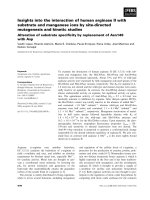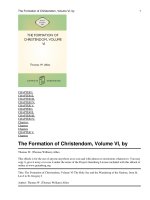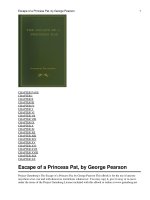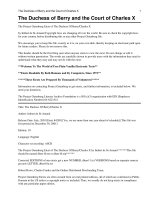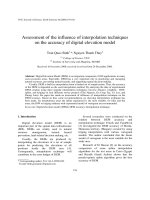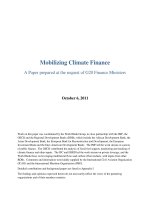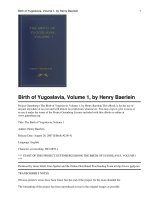The Ramayan of Valmiki – Volume II potx
Bạn đang xem bản rút gọn của tài liệu. Xem và tải ngay bản đầy đủ của tài liệu tại đây (3.66 MB, 502 trang )
The Ramayan of
Valmiki – Volume II
Valmiki
Translated by Ralph T. H. Griffith
*THE RAMAYAN OF VALMIKI*
*Translated into English Verse*
*by*
Ralph T. H. Griffith, M.A.
Principal of the Benares College
1870-1874
CONTENTS
BOOK III.
Canto I The Hermitage.
Canto II Viradha.
Canto III Viradha Attacked.
Canto IV Viradha’s Death.
Canto V Sarabhanga.
Canto VI Rama’s Promise.
Canto VII Sutikshna.
Canto VIII The Hermitage.
Canto IX Sita’s Speech.
Canto X Rama’s Reply.
Canto XI Agastya.
Canto XII The Heavenly Bow.
Canto XIII Agastya’s Counsel.
Canto XIV Jatayus.
Canto XV Panchavati.
Canto XVI Winter.
Canto XVII Surpanakha.
Canto XVIII The Mutilation.
Canto XIX The Rousing Of Khara.
Canto XX The Giants’ Death.
Canto XXI The Rousing Of Khara.
Canto XXII Khara’s Wrath.
Canto XXIII The Omens.
Canto XXIV The Host In Sight.
Canto XXV The Battle.
Canto XXVI Dushan’s Death.
Canto XXVII The Death Of Trisiras.
Canto XXVIII Khara Dismounted.
Canto XXIX Khara’s Defeat.
Canto XXX Khara’s Death.
Canto XXXI Ravan.
Canto XXXII Ravan Roused.
Canto XXXIII Surpanakha’s Speech.
Canto XXXIV Surpanakha’s Speech.
Canto XXXV Ravan’s Journey.
Canto XXXVI Ravan’s Speech.
Canto XXXVII Maricha’s Speech.
Canto XXXVIII Maricha’s Speech.
Canto XXXIX Maricha’s Speech.
Canto XL Ravan’s Speech.
Canto XLI Maricha’s Reply.
Canto XLII Maricha Transformed.
Canto XLIII The Wondrous Deer.
Canto XLIV Maricha’s Death.
Canto XLV Lakshman’s Departure.
Canto XLVI The Guest.
Canto XLVII Ravan’s Wooing.
Canto XLVIII Ravan’s Speech.
Canto XLIX The Rape Of Sita.
Canto L Jatayus.
Canto LI The Combat.
Canto LII Ravan’s Flight.
Canto LIII Sita’s Threats.
Canto LIV Lanka.
Canto LV Sita In Prison.
Canto LVI Sita’s Disdain.
Canto LVII Sita Comforted.
Canto LVIII The Brothers’ Meeting.
Canto LIX Rama’s Return.
Canto LX Lakshman Reproved.
Canto LXI Rama’s Lament.
Canto LXII Rama’s Lament.
Canto LXIII Rama’s Lament.
Canto LXIV Rama’s Lament.
Canto LXV Rama’s Wrath.
Canto LXVI Lakshman’s Speech.
Canto LXVII Rama Appeased.
Canto LXVIII Jatayus.
Canto LXIX The Death Of Jatayus.
Canto LXX Kabandha.
Canto LXXI Kabandha’s Speech.
Canto LXXII Kabandha’s Tale.
Canto LXXIII Kabandha’s Counsel.
Canto LXXI Kabandha’s Death.
Canto LXXV Savari.
Canto LXXVI Pampa.
BOOK IV.
Canto I. Rama’s Lament.
Canto II. Sugriva’s Alarm.
Canto III. Hanuman’s Speech.
Canto IV. Lakshman’s Repl
y.
Canto V The League.
Canto VI The Tokens.
Canto VII Rama Consoled.
Canto VIII Rama’s Promise.
Canto IX Sugriva’s Story.
Canto X Sugriva’s Story.
Canto XI Dundubhi.
Canto XII The Palm Trees.
Canto XIII The Return To Kishkindha.
Canto XIV The Challenge.
Canto XV Tara.
Canto XVI The Fall Of Bali.
Canto XVII Bali’s Speech.
Canto XVIII Rama’s Reply.
Canto XIX Tara’s Grief.
Canto XX Tara’s Lament.
Canto XXI Hanuman’s Speech.
Canto XXII Bali Dead.
Canto XXIII Tara’s Lament.
Canto XXIV Sugriva’s Lament.
Canto XXV Rama’s Speech.
Canto XXVI The Coronation.
Canto XXVII Rama On The Hill.
Canto XXVIII The Rains.
Canto XXIX Hanuman’s Counsel.
Canto XXX Rama’s Lament.
Canto XXXI The Envoy.
Canto XXXII Hanuman’s Counsel.
Canto XXXIII Lakshman’s Entry.
Canto XXXIV Lakshman’s Speech.
Canto XXXV Tara’s Speech.
Canto XXXVI Sugriva’s Speech.
Canto XXXVII The Gathering.
Canto XXXVIII Sugriva’s Departure.
Canto XXXIX The Vanar Host.
Canto XL The Army Of The East.
Canto XLI The Army Of The South.
Canto XLII The Army Of The West.
Canto XLIII The Army Of The North.
Canto XLIV The Ring.
Canto XLV The Departure.
Canto XLVI Sugriva’s Tale.
Canto XLVII The Return.
Canto XLVIII The Asur’s Death.
Canto XLIX Angad’s Speech.
Canto L The Enchanted Cave.
Canto LI Svayamprabha.
Canto LII The Exit.
Canto LIII Angad’s Counsel.
Canto LIV Hanuman’s Speech.
Canto LV Angad’s Reply.
Canto LVI Sampati.
Canto LVII Angad’s Speech.
Canto LVIII Tidings Of Sita.
Canto LIX Sampati’s Story.
Canto LX Sampati’s Story.
Canto LXI Sampati’s Story.
Canto LXII Sampati’s Story.
Canto LXIII Sampati’s Story.
Canto LXIV The Sea.
Canto LXV The Council.
Canto LXVI Hanuman.
Canto LXV
II Hanuman’s
Speech.
The Ramayan of Valmiki - Volume II
1
BOOK III.
Canto I. The Hermitage.
When Rama, valiant hero, stood
In the vast shade of Dandak wood,
His eyes on every side he bent
And saw a hermit settlement,
Where coats of bark were hung around,
And holy grass bestrewed the ground.
Bright with Brahmanic lustre glowed
That circle where the saints abode:
Like the hot sun in heaven it shone,
Too dazzling to be looked upon.
Wild creatures found a refuge where
The court, well-swept, was bright and fair,
And countless birds and roedeer made
Their dwelling in the friendly shade.
Beneath the boughs of well-loved trees
Oft danced the gay Apsarases.(401)
Around was many an ample shed
Wherein the holy fire was fed;
With sacred grass and skins of deer,
Ladles and sacrificial gear,
And roots and fruit, and wood to burn,
And many a brimming water-urn.
Tall trees their hallowed branches spread,
Laden with pleasant fruit, o’erhead;
And gifts which holy laws require,(402)
And solemn offerings burnt with fire,(403)
And Veda chants on every side
That home of hermits sanctified.
There many a flower its odour shed,
And lotus blooms the lake o’erspred.
There, clad in coats of bark and hide,—
Their food by roots and fruit supplied,—
Dwelt many an old and reverend sire
Bright as the sun or Lord of Fire,
All with each worldly sense subdued,
A pure and saintly multitude.
The Veda chants, the saints who trod
The Ramayan of Valmiki - Volume II
2
The sacred ground and mused on God,
Made that delightful grove appear
Like Brahma’s own most glorious sphere.
As Raghu’s splendid son surveyed
That hermit home and tranquil shade,
He loosed his mighty bow-string, then
Drew nearer to the holy men.
With keen celestial sight endued
Those mighty saints the chieftain viewed,
With joy to meet the prince they came,
And gentle Sita dear to fame.
They looked on virtuous Rama, fair
As Soma(404) in the evening air,
And Lakshman by his brother’s side,
And Sita long in duty tried,
And with glad blessings every sage
Received them in the hermitage.
Then Rama’s form and stature tall
Entranced the wondering eyes of all,—
His youthful grace, his strength of limb,
And garb that nobly sat on him.
To Lakshman too their looks they raised,
And upon Sita’s beauty gazed
With eyes that closed not lest their sight
Should miss the vision of delight.
Then the pure hermits of the wood,
Rejoicing in all creatures’ good,
Their guest, the glorious Rama, led
Within a cot with leaves o’erhead.
With highest honour all the best
Of radiant saints received their guest,
With kind observance, as is meet,
And gave him water for his feet.
To highest pitch of rapture wrought
Their stores of roots and fruit they brought.
They poured their blessings on his head,
And “All we have is thine,” they said.
Then, reverent hand to hand applied,(405)
Each duty-loving hermit cried:
“The king is our protector, bright
In fame, maintainer of the right.
He bears the awful sword, and hence
Deserves an elder’s reverence.
The Ramayan of Valmiki - Volume II
3
One fourth of Indra’s essence, he
Preserves his realm from danger free,
Hence honoured by the world of right
The king enjoys each choice delight.
Thou shouldst to us protection give,
For in thy realm, dear lord, we live:
Whether in town or wood thou be,
Thou art our king, thy people we.
Our wordly aims are laid aside,
Our hearts are tamed and purified.
To thee our guardian, we who earn
Our only wealth by penance turn.”
Then the pure dwellers in the shade
To Raghu’s son due honour paid,
And Lakshman, bringing store of roots,
And many a flower, and woodland fruits.
And others strove the prince to please
With all attentive courtesies.
The Ramayan of Valmiki - Volume II
4
Canto II. Viradha.
Thus entertained he passed the night,
Then, with the morning’s early light,
To all the hermits bade adieu
And sought his onward way anew.
He pierced the mighty forest where
Roamed many a deer and pard and bear:
Its ruined pools he scarce could see.
For creeper rent and prostrate tree,
Where shrill cicada’s cries were heard,
And plaintive notes of many a bird.
Deep in the thickets of the wood
With Lakshman and his spouse he stood,
There in the horrid shade he saw
A giant passing nature’s law:
Vast as some mountain-peak in size,
With mighty voice and sunken eyes,
Huge, hideous, tall, with monstrous face,
Most ghastly of his giant race.
A tiger’s hide the Rakshas wore
Still reeking with the fat and gore:
Huge-faced, like Him who rules the dead,
All living things he struck with dread.
Three lions, tigers four, ten deer
He carried on his iron spear,
Two wolves, an elephant’s head beside
With mighty tusks which blood-drops dyed.
When on the three his fierce eye fell,
He charged them with a roar and yell
As furious as the grisly King
When stricken worlds are perishing.
Then with a mighty roar that shook
The earth beneath their feet, he took
The trembling Sita to his side.
Withdrew a little space, and cried:
“Ha, short lived wretches, ye who dare,
In hermit dress with matted hair,
Armed each with arrows, sword, and bow,
Through Dandak’s pathless wood to go:
How with one dame, I bid you tell,
Can you among ascetics dwell?
The Ramayan of Valmiki - Volume II
5
Who are ye, sinners, who despise
The right, in holy men’s disguise?
The great Viradha, day by day
Through this deep-tangled wood I stray,
And ever, armed with trusty steel,
I seize a saint to make my meal.
This woman young and fair of frame
Shall be the conquering giant’s dame:
Your blood, ye things of evil life,
My lips shall quaff in battle strife.”
He spoke: and Janak’s hapless child,
Scared by his speech so fierce and wild,
Trembled for terror, as a frail
Young plantain shivers in the gale.
When Rama saw Viradha clasp
Fair Sita in his mighty grasp,
Thus with pale lips that terror dried
The hero to his brother cried:
“O see Viradha’s arm enfold
My darling in its cursed hold,—
The child of Janak best of kings,
My spouse whose soul to virtue clings,
Sweet princess, with pure glory bright,
Nursed in the lap of soft delight.
Now falls the blow Kaikeyi meant,
Successful in her dark intent:
This day her cruel soul will be
Triumphant over thee and me.
Though Bharat on the throne is set,
Her greedy eyes look farther yet:
Me from my home she dared expel,
Me whom all creatures loved so well.
This fatal day at length, I ween,
Brings triumph to the younger queen.
I see with bitterest grief and shame
Another touch the Maithil dame.
Not loss of sire and royal power
So grieves me as this mournful hour.”
Thus in his anguish cried the chief:
Then drowned in tears, o’erwhelmed by grief,
Thus Lakshman in his anger spake,
The Ramayan of Valmiki - Volume II
6
Quick panting like a spell-bound snake:
“Canst thou, my brother, Indra’s peer,
When I thy minister am near,
Thus grieve like some forsaken thing,
Thou, every creature’s lord and king?
My vengeful shaft the fiend shall slay,
And earth shall drink his blood to-day.
The fury which my soul at first
Upon usurping Bharat nursed,
On this Viradha will I wreak
As Indra splits the mountain peak.
Winged by this arm’s impetuous might
My shaft with deadly force
The monster in the chest shall smite,
And fell his shattered corse.”
The Ramayan of Valmiki - Volume II
7
Canto III. Viradha Attacked.
Viradha with a fearful shout
That echoed through the wood, cried out:
“What men are ye, I bid you say,
And whither would ye bend your way?”
To him whose mouth shot fiery flame
The hero told his race and name:
“Two Warriors, nobly bred, are we,
And through this wood we wander free.
But who art thou, how born and styled,
Who roamest here in Dandak’s wild?”
To Rama, bravest of the brave,
His answer thus Viradha gave:
“Hear, Raghu’s son, and mark me well,
And I my name and race will tell.
Of Satahrada born, I spring
From Java as my sire, O King:
Me, of this lofty lineage, all
Giants on earth Viradha call.
The rites austere I long maintained
From Brahma’s grace the boon have gained
To bear a charmed frame which ne’er
Weapon or shaft may pierce or tear.
Go as ye came, untouched by fear,
And leave with me this woman here:
Go, swiftly from my presence fly,
Or by this hand ye both shall die.”
Then Rama with his fierce eyes red
With fury to the giant said:
“Woe to thee, sinner, fond and weak,
Who madly thus thy death wilt seek!
Stand, for it waits thee in the fray:
With life thou ne’er shalt flee away.”
He spoke, and raised the cord whereon
A pointed arrow flashed and shone,
Then, wild with anger, from his bow,
The Ramayan of Valmiki - Volume II
8
He launched the weapon on the foe.
Seven times the fatal cord he drew,
And forth seven rapid arrows flew,
Shafts winged with gold that left the wind
And e’en Suparna’s(406) self behind.
Full on the giant’s breast they smote,
And purpled like the peacock’s throat,
Passed through his mighty bulk and came
To earth again like flakes of flame.
The fiend the Maithil dame unclasped;
In his fierce hand his spear he grasped,
And wild with rage, pierced through and through,
At Rama and his brother flew.
So loud the roar which chilled with fear,
So massy was the monster’s spear,
He seemed, like Indra’s flagstaff, dread
As the dark God who rules the dead.
On huge Viradha fierce as He(407)
Who smites, and worlds have ceased to be,
The princely brothers poured amain
Their fiery flood of arrowy rain.
Unmoved he stood, and opening wide
His dire mouth laughed unterrified,
And ever as the monster gaped
Those arrows from his jaws escaped.
Preserving still his life unharmed,
By Brahma’s saving promise charmed,
His mighty spear aloft in air
He raised, and rushed upon the pair.
From Rama’s bow two arrows flew
And cleft that massive spear in two,
Dire as the flaming levin sent
From out the cloudy firmament.
Cut by the shafts he guided well
To earth the giant’s weapon fell:
As when from Meru’s summit, riven
By fiery bolts, a rock is driven.
Then swift his sword each warrior drew,
Like a dread serpent black of hue,
And gathering fury for the blow
Rushed fiercely on the giant foe.
Around each prince an arm he cast,
And held the dauntless heroes fast:
The Ramayan of Valmiki - Volume II
9
Then, though his gashes gaped and bled,
Bearing the twain he turned and fled.
Then Rama saw the giant’s plan,
And to his brother thus began:
“O Lakshman, let Viradha still
Hurry us onward as he will,
For look, Sumitra’s son, he goes
Along the path we freely chose.”
He spoke: the rover of the night
Upraised them with terrific might,
Till, to his lofty shoulders swung,
Like children to his neck they clung.
Then sending far his fearful roar,
The princes through the wood he bore,—
A wood like some vast cloud to view,
Where birds of every plumage flew,
And mighty trees o’erarching threw
Dark shadows on the ground;
Where snakes and silvan creatures made
Their dwelling, and the jackal strayed
Through tangled brakes around.
The Ramayan of Valmiki - Volume II
10
Canto IV. Viradha’s Death.
But Sita viewed with wild affright
The heroes hurried from her sight.
She tossed her shapely arms on high,
And shrieked aloud her bitter cry:
“Ah, the dread giant bears away
The princely Rama as his prey,
Truthful and pure, and good and great,
And Lakshman shares his brother’s fate.
The brindled tiger and the bear
My mangled limbs for food will tear.
Take me, O best of giants, me,
And leave the sons of Raghu free.”
Then, by avenging fury spurred,
Her mournful cry the heroes heard,
And hastened, for the lady’s sake,
The wicked monster’s life to take.
Then Lakshman with resistless stroke
The foe’s left arm that held him broke,
And Rama too, as swift to smite,
Smashed with his heavy hand the right.
With broken arms and tortured frame
To earth the fainting giant came,
Like a huge cloud, or mighty rock
Rent, sundered by the levin’s shock.
Then rushed they on, and crushed and beat
Their foe with arms and fists and feet,
And nerved each mighty limb to pound
And bray him on the level ground.
Keen arrows and each biting blade
Wide rents in breast and side had made;
But crushed and torn and mangled, still
The monster lived they could not kill.
When Rama saw no arms might slay
The fiend who like a mountain lay,
The glorious hero, swift to save
In danger, thus his counsel gave:
“O Prince of men, his charmed life
No arms may take in battle strife:
Now dig we in this grove a pit
The Ramayan of Valmiki - Volume II
11
His elephantine bulk to fit,
And let the hollowed earth enfold
The monster of gigantic mould.”
This said, the son of Raghu pressed
His foot upon the giant’s breast.
With joy the prostrate monster heard
Victorious Rama’s welcome word,
And straight Kakutstha’s son, the best
Of men, in words like these addressed:
“I yield, O chieftain, overthrown
By might that vies with Indra’s own.
Till now my folly-blinded eyes
Thee, hero, failed to recognize.
Happy Kausalya! blest to be
The mother of a son like thee!
I know thee well, O chieftain, now:
Rama, the prince of men, art thou.
There stands the high-born Maithil dame,
There Lakshman, lord of mighty fame.
My name was Tumburu,(408) for song
Renowned among the minstrel throng:
Cursed by Kuvera’s stern decree
I wear the hideous shape you see.
But when I sued, his grace to crave,
The glorious God this answer gave:
“When Rama, Dasaratha’s son,
Destroys thee and the fight is won,
Thy proper shape once more assume,
And heaven again shall give thee room.”
When thus the angry God replied,
No prayers could turn his wrath aside,
And thus on me his fury fell
For loving Rambha’s(409) charms too well.
Now through thy favour am I freed
From the stern fate the God decreed,
And saved, O tamer of the foe,
By thee, to heaven again shall go.
A league, O Prince, beyond this spot
Stands holy Sarabhanga’s cot:
The very sun is not more bright
Than that most glorious anchorite:
To him, O Rama, quickly turn,
The Ramayan of Valmiki - Volume II
12
And blessings from the hermit earn.
First under earth my body throw,
Then on thy way rejoicing go.
Such is the law ordained of old
For giants when their days are told:
Their bodies laid in earth, they rise
To homes eternal in the skies.”
Thus, by the rankling dart oppressed,
Kakutstha’s offspring he addressed:
In earth his mighty body lay,
His spirit fled to heaven away.
Thus spake Viradha ere he died;
And Rama to his brother cried:
“Now dig we in this grove a pit
His elephantine bulk to fit.
And let the hollowed earth enfold
This mighty giant fierce and bold.”
This said, the valiant hero put
Upon the giant’s neck his foot.
His spade obedient Lakshman plied,
And dug a pit both deep and wide
By lofty souled Viradha’s side.
Then Raghu’s son his foot withdrew,
And down the mighty form they threw;
One awful shout of joy he gave
And sank into the open grave.
The heroes, to their purpose true,
In fight the cruel demon slew,
And radiant with delight
Deep in the hollowed earth they cast
The monster roaring to the last,
In their resistless might.
Thus when they saw the warrior’s steel
No life-destroying blow might deal,
The pair, for lore renowned,
Deep in the pit their hands had made
The unresisting giant laid,
And killed him neath the ground.
Upon himself the monster brought
From Rama’s hand the death he sought
The Ramayan of Valmiki - Volume II
13
With strong desire to gain:
And thus the rover of the night
Told Rama, as they strove in fight,
That swords might rend and arrows smite
Upon his breast in vain.
Thus Rama, when his speech he heard,
The giant’s mighty form interred,
Which mortal arms defied.
With thundering crash the giant fell,
And rock and cave and forest dell
With echoing roar replied.
The princes, when their task was done
And freedom from the peril won,
Rejoiced to see him die.
Then in the boundless wood they strayed,
Like the great sun and moon displayed
Triumphant in the sky.(410)
The Ramayan of Valmiki - Volume II
14
Canto V. Sarabhanga.
Then Rama, having slain in fight
Viradha of terrific might,
With gentle words his spouse consoled,
And clasped her in his loving hold.
Then to his brother nobly brave
The valiant prince his counsel gave:
“Wild are these woods around us spread;
And hard and rough the ground to tread:
We, O my brother, ne’er have viewed
So dark and drear a solitude:
To Sarabhanga let us haste,
Whom wealth of holy works has graced.”
Thus Rama spoke, and took the road
To Sarabhanga’s pure abode.
But near that saint whose lustre vied
With Gods, by penance purified,
With startled eyes the prince beheld
A wondrous sight unparalleled.
In splendour like the fire and sun
He saw a great and glorious one.
Upon a noble car he rode,
And many a God behind him glowed:
And earth beneath his feet unpressed(411)
The monarch of the skies confessed.
Ablaze with gems, no dust might dim
The bright attire that covered him.
Arrayed like him, on every side
High saints their master glorified.
Near, borne in air, appeared in view
His car which tawny coursers drew,
Like silver cloud, the moon, or sun
Ere yet the day is well begun.
Wreathed with gay garlands, o’er his head
A pure white canopy was spread,
And lovely nymphs stood nigh to hold
Fair chouris with their sticks of gold,
Which, waving in each gentle hand,
The forehead of their monarch fanned.
God, saint, and bard, a radiant ring,
The Ramayan of Valmiki - Volume II
15
Sang glory to their heavenly King:
Forth into joyful lauds they burst
As Indra with the sage conversed.
Then Rama, when his wondering eyes
Beheld the monarch of the skies,
To Lakshman quickly called, and showed
The car wherein Lord Indra rode:
“See, brother, see that air-borne car,
Whose wondrous glory shines afar:
Wherefrom so bright a lustre streams
That like a falling sun it seems:
These are the steeds whose fame we know,
Of heavenly race through heaven they go:
These are the steeds who bear the yoke
Of Sakra,(412) Him whom all invoke.
Behold these youths, a glorious band,
Toward every wind a hundred stand:
A sword in each right hand is borne,
And rings of gold their arms adorn.
What might in every broad deep chest
And club-like arm is manifest!
Clothed in attire of crimson hue
They show like tigers fierce to view.
Great chains of gold each warder deck,
Gleaming like fire beneath his neck.
The age of each fair youth appears
Some score and five of human years:
The ever-blooming prime which they
Who live in heaven retain for aye:
Such mien these lordly beings wear,
Heroic youths, most bright and fair.
Now, brother, in this spot, I pray,
With the Videhan lady stay,
Till I have certain knowledge who
This being is, so bright to view.”
He spoke, and turning from the spot
Sought Sarabhanga’s hermit cot.
But when the lord of Sachi(413) saw
The son of Raghu near him draw,
He hastened of the sage to take
His leave, and to his followers spake:
The Ramayan of Valmiki - Volume II
16
“See, Rama bends his steps this way,
But ere he yet a word can say,
Come, fly to our celestial sphere;
It is not meet he see me here.
Soon victor and triumphant he
In fitter time shall look on me.
Before him still a great emprise,
A task too hard for others, lies.”
Then with all marks of honour high
The Thunderer bade the saint good-bye,
And in his car which coursers drew
Away to heaven the conqueror flew.
Then Rama, Lakshman, and the dame,
To Sarabhanga nearer came,
Who sat beside the holy flame.
Before the ancient sage they bent,
And clasped his feet most reverent;
Then at his invitation found
A seat beside him on the ground.
Then Rama prayed the sage would deign
Lord Indra’s visit to explain;
And thus at length the holy man
In answer to his prayer began:
“This Lord of boons has sought me here
To waft me hence to Brahma’s sphere,
Won by my penance long and stern,—
A home the lawless ne’er can earn.
But when I knew that thou wast nigh,
To Brahma’s world I could not fly
Until these longing eyes were blest
With seeing thee, mine honoured guest.
Since thou, O Prince, hast cheered my sight,
Great-hearted lover of the right,
To heavenly spheres will I repair
And bliss supreme that waits me there.
For I have won, dear Prince, my way
To those fair worlds which ne’er decay,
Celestial seat of Brahma’s reign:
Be thine, with me, those worlds to gain.”
Then master of all sacred lore,
The Ramayan of Valmiki - Volume II
17
Spake Rama to the saint once more:
“I, even I, illustrious sage,
Will make those worlds mine heritage:
But now, I pray, some home assign
Within this holy grove of thine.”
Thus Rama, Indra’s peer in might,
Addressed the aged anchorite:
And he, with wisdom well endued,
To Raghu’s son his speech renewed:
“Sutikshna’s woodland home is near,
A glorious saint of life austere,
True to the path of duty; he
With highest bliss will prosper thee.
Against the stream thy course must be
Of this fair brook Mandakini,
Whereon light rafts like blossoms glide;
Then to his cottage turn aside.
There lies thy path: but ere thou go,
Look on me, dear one, till I throw
Aside this mould that girds me in,
As casts the snake his withered skin.”
He spoke, the fire in order laid
With holy oil due offerings made,
And Sarabhanga, glorious sire,
Laid down his body in the fire.
Then rose the flame above his head,
On skin, blood, flesh, and bones it fed,
Till forth, transformed, with radiant hue
Of tender youth, he rose anew,
Far-shining in his bright attire
Came Sarabhanga from the pyre:
Above the home of saints, and those
Who feed the quenchless flame,(414) he rose:
Beyond the seat of Gods he passed,
And Brahma’s sphere was gained at last.
The noblest of the twice-born race,
For holy works supreme in place,
The Mighty Father there beheld
Girt round by hosts unparalleled;

